
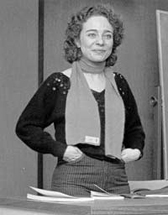
The Poet’s Voice
Interview by
Joseph Pivato
Mary di Michele is a poet, novelist and essayist who has explored questions of creativity, women as artists, ethnic identity and immigration. Her recent novel, Tenor of Love, deals with the life of Enrico Caruso and the three women in his life. Her book, Mimosa and Other Poems (1981) won awards and critical recognition. Debriefing the Rose is her most recent poetry collection.
This interview with Mary di Michele is in two parts. The first part is from a conversation that Joseph Pivato had with Mary in 1984 during her visit to Edmonton, Alberta. The second part of the interview was conducted in 2004.
Part I
Aurora: You were six years old when you came to Canada in 1955. Have you ever made a return trip to Italy and if so what happened?
Mary di Michele: I made my first trip back in 1972. I spent the summer there with my whole family. Because of my very intense and detailed childhood memories my body remembered things that I did not consciously remember. When we were in my mother’s village I asked my mother about things that had changed and she would say, “How can you remember that?”
Aurora: Do you feel Canadian, Italian-Canadian or Italian?
Mary di Michele: At times I feel confused about my identity. I grew up in Canada but my 1972 trip brought out this confusion. My Italian identity started to come out more and more. By the end of the summer I started to dream in Italian. I don’t know if this would happen again. There have been a lot of changes since then. I was still living at home in an Italian environment. I have been on my own for quite a number of years now. At one point I was married to an English-Canadian and my daughter is part Italian and part Canadian. My identity is wrapped up in her as well. On my next trip to Italy I will examine how I feel and write about it.
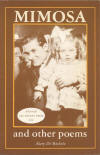
Aurora: Your collection of poems, Mimosa and Other Poems (1981) is a very successful book that is now in its second printing. To what do you attribute this popularity?
Mary di Michele: Publishing successes in poetry are very relative. The appeal of Mimosa is probably due to the fact that I am writing about things other people are in or want to read. We will soon see if this is true of my new book, Necessary Sugar.
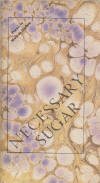
Aurora: Do you feel that your bilingual language experience, Italian and English, was a positive influence on your writing?
Mary di Michele: I think it was just a different influence from that of most Canadians. The majority of Canadian writers come from the first language groups in this country, English or French. They are working in their mother tongue, and are primarily from the middle class. I am in a small minority in that I am not writing in the first language that I learned to speak, although I was educated in English. In addition to speaking Italian my parents were working class and there were no books around our house. Although my father is interested in books now, when I was a child he had no time to read. He was always working overtime.
I remember my grade two teacher took us as a class to the library and my life changed at that point. I got a library card and found a kind of happiness. One of the advantages of this country is that we have a good library system. All you need is a nickel for a card and you have access to a world of learning.
Aurora: Before coming to Canada you and your family lived in Belgium for a while. Did the multilingual experience of Belgium and Canada make you a more sensitive writer?
Mary di Michele: I always had a fascination for language and being exposed to many languages, French, Flemish, Russian, early in my life probably accentuated this.
Aurora: I have often felt that Italian-Canadian writers have a good deal in common with French-Canadians. Do you feel that this is true?
Mary di Michele: I don’t know. I am not as familiar with Quebec writing as I should be, though I read French. But it is my impression that women writers in Quebec share many of the concerns of many other women authors, Italian, English, and Spanish.
Aurora: In your poetry there are a large number of references to your experiences of growing up. Was your childhood a happy one?
Mary di Michele: I had a very unhappy childhood. I was extremely lonely, very alienated. I felt that I was not like most other children. I spent most of my time reading by myself.
Aurora: Do you feel that this was because of your immigrant background or is this part of your individualistic temperament?
Mary di Michele: I don’t think that it is specific to my Italian background. I am naturally very introverted and this was exaggerated by the immigrant experience of being a stranger. My feelings as an immigrant child made me withdraw even more.
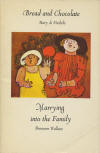
Aurora: Your early poems in Bread and Chocolate deal with the struggle of the immigrant girl; your later work in Necessary Sugar addresses the condition of women. Do you feel that your experience as an immigrant girl has helped you to have a better perspective as a woman writer, has made you a better writer?
Mary di Michele: I feel that it has made me more radical in my responses. My family situation was a very patriarchal one. Both my father and mother tried to make me conform, to behave and direct my expectations to a limited and very female role. Because I was unhappy with the constrictions of that role I rebelled. In this way my immigrant experience made me more radical.
Aurora: Let me pursue that idea further. Do you feel that your experiences as an outsider, as someone peripheral to the majority society, helped you to be more sensitive to the issues of women as people marginalized in a male-dominated society?
Mary di Michele: It is a very complex situation. It is like existing on two comparable levels, a kind of double jeopardy. Because of my aspirations I have been an outsider in my family and ethnic community, and because of my ethnic identity and female character I am an outsider in the larger, public society generally.
Aurora: Most Italian-Canadian girls do not go to university. Was your family supportive of you going to university?
Mary di Michele: My mother was dead against it, but my father supported me in my wish to go to university. It is very ironic too, but my father was very indulgent on one level. His primary concern was to keep me within the home, and whatever would make me happy within that framework was fine with him. My mother thought it was a waste because she had very traditional views of what my role would be. She expected me to marry and have children.
Aurora: Was your university education at the University of Toronto valuable for your writing?
Mary di Michele: I think that it was very important for me to have a formal university education because it helped me with intellectual self-confidence. As an immigrant I found it was necessary to have formal training. You may learn just a much on your own through extensive reading, but it does not give you the kind of assurance that university programs can give you.
Aurora: At university you chose to study literature. Was this because you inclined towards writing?
Mary di Michele: I have always loved literature. I initially thought I would work in history because I had a keen interest in history at the time. I took one English course and I became fascinated with the treatment of literature. The study of literature was very different at university than it had been in high school. I thought, “This is what I want to do. Literature is what I love and this kind of intellectual approach is very satisfying.” After my first year I immediately concentrated on English literature and some French literature courses.
Aurora: For your M.A. at the University of Windsor you studied with novelist, Joyce Carol Oates. Did this have a strong effect on your writing?
Mary di Michele: Yes, a very profound effect, as a matter of fact, although not immediately because the negative aspects of my academic training was that it made me concentrate primarily on intellectual information and not pay sufficient attention to my own experience. She essentially taught me that a writer has to dive into her own experience. I already knew about intellectual subjects, but I needed to be put in touch  with myself. That was important. I think that only writers can guide other writers with this. It seems that academics neglect this approach, especially with their bias for the New Criticism. I began to look back into my own immigrant experience, and as a result I found my voice. Dealing with that background was fundamental in my development as a writer, in terms of my identity and my voice. Understanding my experience as an immigrant and as a woman was absolutely essential for me and for my work.
with myself. That was important. I think that only writers can guide other writers with this. It seems that academics neglect this approach, especially with their bias for the New Criticism. I began to look back into my own immigrant experience, and as a result I found my voice. Dealing with that background was fundamental in my development as a writer, in terms of my identity and my voice. Understanding my experience as an immigrant and as a woman was absolutely essential for me and for my work.
Aurora: Some of the Italian-Canadian writers I have met are reluctant to be identified as ethnic writers. They would prefer to be regarded as Canadian or English language writers. Is there pressure in the writing and publishing community to conform to the majority language group or is this a personal choice on the part of writers?
Mary di Michele: I think that part of the resistance to ethnic labels is always that fear that one is going to be treated in a subcategory and not considered seriously. You want to believe that your writing, your poetry, addresses a general audience. You know, a woman writer has the same problem: she wants to talk about experience from the woman’s point of view, but at the same time she does not want to publish only in women’s periodicals or to be read only by women. As you say this experience is speaking to all readers. With ethnic writers it is the same kind of fear that one may be put into a peripheral category of life and literature. It is not a desire to conform but a wish to be given a fair reading by critics and readers.
Aurora: Your poems, especially your recent work, consciously deal with the feminine perspective on life. Why is it important for you to write about the woman’s experience?
Mary di Michele: The obvious answer is that it is only natural for a woman writer to use a woman’s point of view. It is important for me as a writer to describe my particular experiences, to explore the private realms of life that are common to many women.  There is, however, also an important social function to women’s literature. It is vital to civilization to have a literature that embodies, gives voice, and gives form to female experiences. The woman’s sensibility needs to be incorporated as part of the literary tradition of this country, as part of the value system of our society. The course our society is following now is primarily patriarchal. The threat of nuclear war is a result of this male approach to international affairs. This is a radical view of our present situation. On all levels it is important that the woman’s point of view be heard, that women stop being silent and speak out against the violence of a patriarchal society.
There is, however, also an important social function to women’s literature. It is vital to civilization to have a literature that embodies, gives voice, and gives form to female experiences. The woman’s sensibility needs to be incorporated as part of the literary tradition of this country, as part of the value system of our society. The course our society is following now is primarily patriarchal. The threat of nuclear war is a result of this male approach to international affairs. This is a radical view of our present situation. On all levels it is important that the woman’s point of view be heard, that women stop being silent and speak out against the violence of a patriarchal society.
Aurora: Your poems often deal with family situations. What has been the reaction of women to your poems that are critical of family or marriage conditions?
Mary di Michele: Italian-Canadian women at my readings often come up to me; they take my hand, they thank me, and they say, “Yes, this is what I feel too. It is good that you are saying this.” In a sense my poems give these people a voice. There is an irony here because these women have often conformed to very conventional lives, but on another level they seem to get some vicarious pleasure from my criticism. It is as if part of their being is resisting the pressure of traditional female roles.
Aurora: Although they are disguised in some way, your poems have always been very personal: they deal with felt suffering, real conflict and private feelings. Do you find that this frankness gives your work stronger appeal for readers?
Mary di Michele: I don’t know if this gives my work more appeal, maybe for some people. Others may be put off by it, and think it is very naively confessional or too personal. Some may not be attracted by the naked emotion. I am not afraid to express raw emotion in poetry. I am trying to push language into a realm of passionate expression where I think it should be. I am working in reaction to the abstract language that bureaucrat’s use, or the meaningless language that advertising uses. As a poet it is my task to revitalize language. I think that it can be revitalized by bringing true feeling into writing.
Aurora: Your first language was Italian and you learned English in Canada at school. How would you describe your language experiences as a woman writer?
Mary di Michele : These are really two different experiences that have some parallels. When I first came to Canada, English was entirely new to me, foreign, and I had to learn it and make it my own. Later as a woman writer I found the language male-dominated. Historically, written language has been a male form of communication. With other women writers I am working to make English our own language as well.
Aurora: When they are young Italian-Canadians are living in an Italian language environment. During the formative years the language of home, of love and other emotions is Italian. Later when they go to school, English becomes the language of education and public communication. The two worlds often remain separate; there is little transfer from the private to the public world. Did this kind of experience affect your writing?
Mary di Michele: I think that what you say is true to a certain extent. When I look at my own experience, however, I see that at some point I wanted to identify myself with the intellectual and public world of English. I took English to be my own and wanted it because it seemed to me to be an escape from the kind of emotional morass of the Italian family. While at home my position was that of a daughter, I wanted more than the emotional life of a daughter, and later of a mother. I wanted an intellectual life too, so I embraced English as my salvation. On the other hand I am aware that Italian represented a side of my life charged with feeling, an emotional dimension. For this reason Italian words often come out in my work as if they came from another realm of experience or intensity of feeling. These two worlds may continue to create a tension in my life and in my work.
Part II
Part two of this interview was done in the fall of 2004. Mary is living in Montreal, is teaching creative writing at Concordia University and has finished work on her novel,
Tenor of Love .
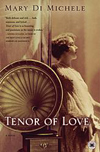
Aurora: What would you describe as the two or three major events in your career or life since 1985?
Mary di Michele : Being hired by
Concordia University and turning to writing prose fiction I think are the two major turns in my career. In order to teach I need to articulate and hone what I know about writing and reading literature as a writer (very different than as an academic). Through teaching I have learned a lot and continue to learn. The novel has opened new dimensions to writing for me. To use a cinematic metaphor, for me poetry is the art of the close-up while with the novel I get to use different kinds of shots including the wide angle lens as well.
Aurora: You have been living in the bilingual city of Montreal for many years. Has the French language and culture of Quebec affected your writing?
Mary di Michele: I’m not as interested in French as the ‘official language’ here as I was in French as a cultural language when I lived in Toronto. The most disturbing aspect for me really is that I very keenly feel myself to be an immigrant again. I don’t have the fluency in my speaking of French that I do in English. I can’t pass myself off as a native speaker. In Quebec I’m an immigrant speaker of the language with all that awkwardness and anxiety. I only now fully recognize what father must have felt in his public dealings with the bank, the doctor, etc.
Aurora: In that time did you deliberately try to move away from Italian-Canadian themes, or did it just happen?
Mary di Michele: For the last five years I’ve been working on a novel which explores on one level what happens to the identity of an artist living between Italy and America. The novel has enabled me to revisit Italian immigrant thematic territory, if you will, but in a new, and I think, larger, in every sense of the word, way. It’s true though that there’s nothing Canadian in this novel, except for one small instance, a letter that Caruso writes on a train while he is on tour and travelling between Montreal and Toronto.
Aurora: You have made several trips to Italy. One is reflected in the poem, “Rilke Sentiero,” later called, “La Benvenuta.” How have these trips affected your writing?
Mary di Michele: There’s a myth of return, I’m thinking of that Greek hero (I can’t recall the name) who to maintain strength must literally stay in touch with the earth. Hercules defeats him by keeping him suspended in the air. In returning to Italy I replenish something in myself, an essential source for feeling and writing. If I didn’t return literally to the country and or to Italian themes periodically, would I become imaginatively depleted and die creatively? But I continue to be drawn back there, so I’m not prepared to find out just yet.
Aurora: How have your other travels affected your writing? Your trip to Chile - for example?
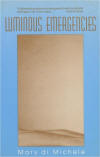
Mary di Michele: Yes, I have written about my trip to Chile in 1987. Any dislocation of language and landscape affects me deeply. (see
Luminous Emergencies).
Aurora: In your retrospective anthology, Stranger in You (1995) you include poems from each of your previous collections. How did you decide which poems to select? Or why did you select these poems?
Mary di Michele: I needed to do new selected poems and rethink the whole process with some real depth. From my early work I chose the poems that embarrassed me the least, and the rest, from those poems which seemed to speak to the larger themes running throughout my writing. I also tried rewriting some of the early work, not always an improvement I’m afraid on looking back now!
Aurora: Over your career you have moved away from literary conventions. In your book, Debriefing the Rose, I found that your poems are more experimental than in your previous books. Do you agree?
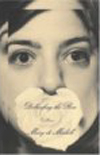
Mary di Michele: That book comes out of concerns that I’ve had all along as a writer, explored in my essay, “Conversations with the Living and the Dead,” published in the anthology Language in Her Eye in 1991, if I recall correctly. Debriefing the Rose explores some new territory for me but also returns to familiar ones. The dramatic monologue has been a form I’ve used a lot, including “Mimosa,” “The Afterlife of Shoes” (in Luminous Emergencies) and “My Hart Crane” in Debriefing the Rose. The move into the prose poetry, a whole section, Respondez s’il vous plait, in Debriefing was new for me if not for poetry, after all Baudelaire invented the prose poem in the 19 th century. That’s hardly experimental. The ‘channeling’ or conversations with Sappho though do look different –– if that’s what you mean. Anything that departs from conventional practice might be called ‘experimental.’ I hope there are some such departures in each new book.
Aurora: You have just finished your book, Tenor of Love, on Italian singer,
Caruso. What prompted you to write a novel based on the life of Caruso?
Mary di Michele: It started with a song. I was haunted by Lucio Dalla’s song about Caruso, particularly the lines: “con un po’ di trucco e con la mimica/ puoi diventare un altro.” An Italian artist seduced by the “lights of America,” living out his adult life divided between the two, crossing back and forth. In a sense he’s my artistic ‘grandfather.’ But emotionally as a figure he’s close to my father. My father has always been passionate about opera. I am dedicating the novel to him.
Aurora: This book, Tenor of Love, is your second novel. It is published simultaneously in Canada and the U.S. The working title was “Singing Lessons.” Are you planning to work on other novels in the future?
Mary di Michele: The title of the novel was changed to Tenor of Love. The American publisher, Simon and Schuster, already had a book with the title, Singing Lessons. Yes, to your question, I am planning to write a novel about
Pier Paolo Pasolini, including some playing around with his poetry, not translations, but imitations of ‘poems not written.’ The working title for it now is “Impure Thoughts.” I did some ‘scouting’ for the book while I was in Bologna in the summer of 2003. Pasolini is such a giant that at times I just feel overwhelmed by the audacity of even trying to write such a book. But I was encouraged to pursue this project by the people I spoke to in Italy including Gianni Scalia, a retired professor of philosophy, who was a good friend of Pasolini. I am planning to spend some time in Casarsa, Pasolini’s hometown in Friuli. I travelled in eastern Friuli when I visited Duino for my work on Rilke. I seem to be returning to Italy, again, living the myth of return.
Related Links
For more information see Joseph Pivato,
Mary di Michele: Essays on Her Works (Guernica Editions, 2007)
Recent publications, activities,
Mary di Michele at Concordia University
Awards
- CBC Poetry Competition, 1980
- Silver Medal, DuMaurier Award for Poetry, 1982
- Air Canada Writing Award, 1984
- Toronto Arts Award, 1990
- ARC Confederation Poets Award, 1996
Distinctions
- Trillium Prize short-list, 1990 — Luminous Energies
- Harper's Magazine Notable Book, 1994 — Under My Skin
Joseph Pivato is
Professor in the Centre for Language and Literature at Athabasca University (now
retired).
Updated
March 2018
Aurora Online
Citation Format
Joe Pivato (2008) The Poet’s Voice: An Interview with Mary di Michele, Aurora Online
 with myself. That was important. I think that only writers can guide other writers with this. It seems that academics neglect this approach, especially with their bias for the New Criticism. I began to look back into my own immigrant experience, and as a result I found my voice. Dealing with that background was fundamental in my development as a writer, in terms of my identity and my voice. Understanding my experience as an immigrant and as a woman was absolutely essential for me and for my work.
with myself. That was important. I think that only writers can guide other writers with this. It seems that academics neglect this approach, especially with their bias for the New Criticism. I began to look back into my own immigrant experience, and as a result I found my voice. Dealing with that background was fundamental in my development as a writer, in terms of my identity and my voice. Understanding my experience as an immigrant and as a woman was absolutely essential for me and for my work. 




 There is, however, also an important social function to women’s literature. It is vital to civilization to have a literature that embodies, gives voice, and gives form to female experiences. The woman’s sensibility needs to be incorporated as part of the literary tradition of this country, as part of the value system of our society. The course our society is following now is primarily patriarchal. The threat of nuclear war is a result of this male approach to international affairs. This is a radical view of our present situation. On all levels it is important that the woman’s point of view be heard, that women stop being silent and speak out against the violence of a patriarchal society.
There is, however, also an important social function to women’s literature. It is vital to civilization to have a literature that embodies, gives voice, and gives form to female experiences. The woman’s sensibility needs to be incorporated as part of the literary tradition of this country, as part of the value system of our society. The course our society is following now is primarily patriarchal. The threat of nuclear war is a result of this male approach to international affairs. This is a radical view of our present situation. On all levels it is important that the woman’s point of view be heard, that women stop being silent and speak out against the violence of a patriarchal society. 

